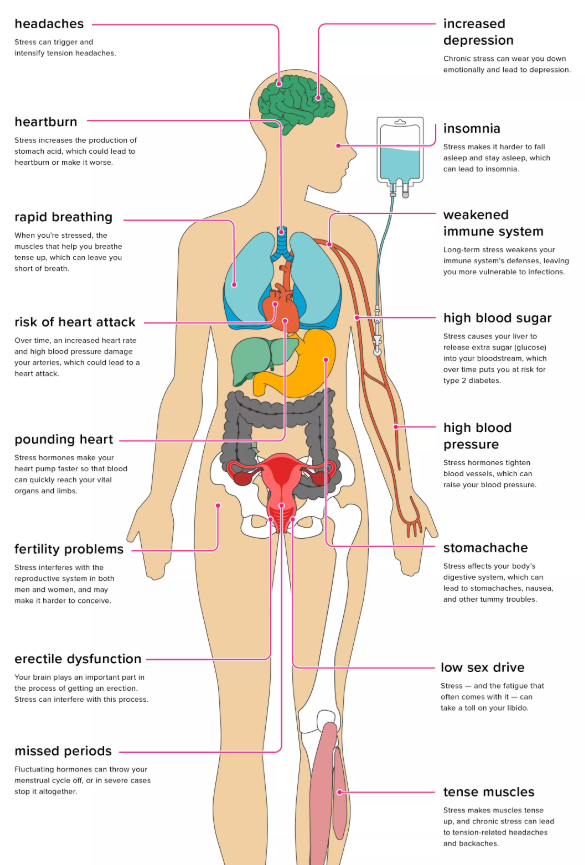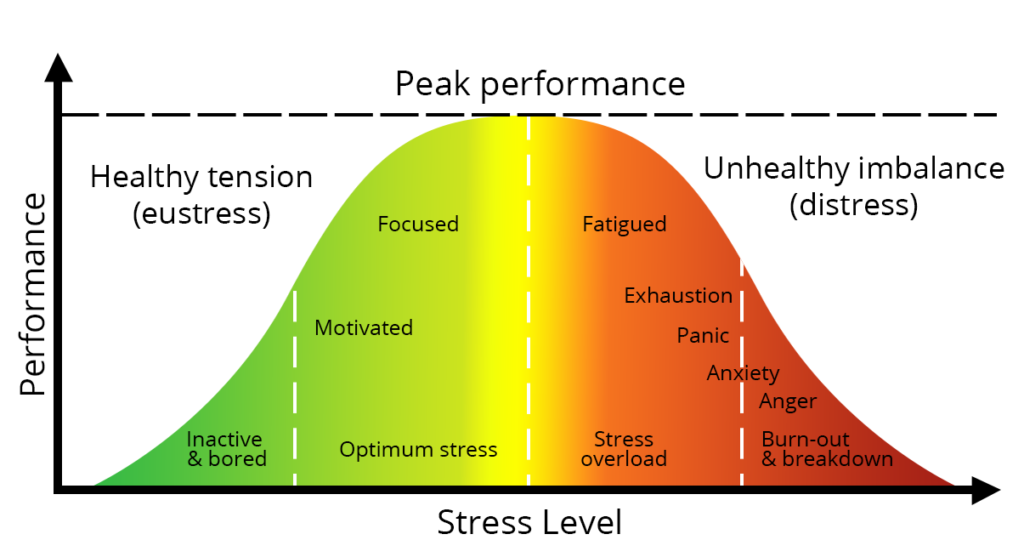Did you know that April is Stress Awareness Month? This April, we have articles dealing with the most important aspects of stress, including how to identify stress in yourself, how to overcome it, and how we can reduce stress in difficult times such as the coronavirus pandemic. Stay tuned for our posts on BlankSlate Blog!
What is stress and why does it happen?
Stress is an emotion which can occur any time in our lives. In fact, small doses of stress are experienced daily. However. a high concentration of stress hormones in our system for a prolonged period of time can harm us – causing serious physiological and psychological damage in the long run.

Stress is a natural biological response meant for survival purposes — the fight or flight instinct in our body causes stress levels and adrenaline to rise. Unfortunately, instead of coping with stress, we often just react to the stressors, which don’t solve the problem. Learning to manage stress by identifying the kinds of stress facing us can help us lead a more balanced life.
In this article, we follow a story of someone who’s stressed, and identify the kinds of stress she faces, as well as how she can handle it. Let’s look at this example:
B and her husband have a son who is studying. To help him out, B quit her job, spent time with him to prepare for an important exam. However, his results were not good, whereas some of B’s friends have children who did very well in the exam. She is upset and thinks that her son should have studied harder, and she should have been stricter with him. She worries that he may not get admission to a prestigious school. As a mother, B feels she has not done enough for her son, and that she has even failed her husband. B is resentful, irritable and constantly nags at her son, resulting in conflicts.
Performance Stress
“I should have been stricter with my son. He did not do well and now he cannot get to a prestigious school because of my actions.”
Performance stress happens when we worry about the impact of our actions be it in work, relationships, or any aspect of our lives. In our case study, B worries that she is not performing well in her role as a parent, and not doing the best for her son to allow him to get into a prestigious school.
As a result of this, we bring additional stress into our lives. We frantically worry about what damage we have done, instead of focusing on what we could have done better. This persistent thought about perceived damage often creates anguish.
In fact, it is also common to start comparing our performance with others, and put ourselves down when we feel that others are doing better. This creates negative feelings of our own self-worth, and brings even more performance stress.
Expectation Stress
“Why couldn’t my son have studied harder?”
Expectation stress occurs when something doesn’t happen the way we expect it to, and this difference causes anxiety and worry in us.
We have our own expectations of how others should behave, but this means we indirectly credit others for being ‘hurtful and ignorant of our needs’. These thoughts create anger, resentment and hurt in us.
We are all unique individuals with different ways of dealing with situations. What we expect someone to do might not be obvious to them. Instead, we have to understand what’s happening on the other side. By practicing positive communication, where we clearly talk to other parties beforehand about what they want and to share our point of view, we can clear doubts and set basis for others expectations of behaviors. With clear communication, we can stay clear of assumptions that hurt us.
Perfectionism Stress
“I should know how to handle children. I haven’t done enough.”
Perfectionism stress is pressure on ourselves to do better, to execute our tasks at a level that we think is the peak.
Perfectionism stress can creep up both before and after an important activity, and we stress ourselves out by overthinking. Perfectionists might spend a lot of time thinking about the ideal outcome, blaming themselves, which leads to unnecessary pressure that ultimately harms performance.
One trick to deal with overthinking perfectionism is to grade our efforts on a scale of 1 to 10 and allow ourselves to accept anything half way or more. Instead of focusing on what went wrong, focus instead on what went right.
We need healthy levels of tension in our lives to be motivated and perform, but too much stress is unhealthy for us.

Emotional Distress
“I have too much going on. My life is out of control and I can’t deal with it”
Emotional stress is characterized by overwhelming emotions that we feel we cannot handle, causing us distress. This might be from traumatic events, like guilt or grief, or external situations like the coronavirus COVID-19 panic. The above reasons for stress create an emotional upheaval. Emotions are complex and they just happen, we have no control over them.
Emotional stress arising from a large influx of emotions is best handled by identifying and managing these emotions. We need to understand what we are feeling and what made us feel this way. We often run away from our emotions. Carl Jung once said, “What we resist will persist”. So, we need to acknowledge the presence of these emotions that control us and find ways to manage them.
Let’s take the situation that B is in: Her son did not do well in his exams. What are some of the thoughts and resultant emotions that she could have?
| Thought | Resultant Emotion |
|---|---|
| I should have pushed my son harder; I have failed him | Self-blame |
| My son will not get admission to a good school | Worry |
| My friends’ children did better | Envy |
If B could reframe her thoughts and shift focus in thinking, she can gain better control over her emotional stress.
| New Thought | Resultant Emotion |
|---|---|
| I quit my job to help my son; I have put in my best effort | Self-fulfillment |
| There will be more opportunities for my son in the future | Hope |
| I can look to my friends and learn from what they have done | Inspiration |
Our Tips for Managing Stress
- Practice postponing worry – set a ‘worry hour’ and push every worry of the day to that hour. This helps to create a different kind of relationship with the worry, where we are reminded that our mind is not focusing on a problem that we could solve right now. By pushing it to a specified time where we can be compassionate, the worry has less impact. Speaking of compassionate self-care…
- Try out Mindfulness and Deep Breathing, habits that are proven to calm us down and shift our focus.
- Reframing – is the glass half full or half empty? The glass is refillable. Focusing on the positive aspects, the ‘glass full’ aspects, and we can regain a sense of control.
- Physical Exercise – lifts mood, recharges the body and freshens the mind.
- Indulge in a meaningful leisure activity – gardening, cooking, interacting with nature, listening to music etc.
- Engage in tasks with others – having a meal with family, sharing our thoughts with friends etc.
- Share your worries – Talking it out with someone may help get a different perspective.
- Talk to a professional – When things get too overwhelming, professional help reduces the psychological impact of stress.
Now that we know more about the common reasons of stress, and some techniques to manage stress, how can we change our mindset to approach and cope with stress in the future?
Remember the 90/10 rule that we talked about in past posts. It’s in our own attitude, how we react in a stressful situation that will determine how well we cope with it.
At BlankSlate Counselling, we practice empowering individuals with their strength that is within them. Our motto: ‘From Being to Becoming’ encourages individuals to steer their minds and therefore their lives, in the direction that they want it to go. No matter the challenge one is facing, from stress to mental health struggles, our trusted counsellors are here to help.
Give us a call at 6698 5198, or send us a message today.




Pingback: Case Study: Dealing with Anxiety & Depression | BlankSlate Counselling